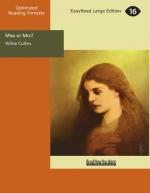“It is contrary to the usual course of proceeding in such cases, Richard,” Sir Joseph began.
“Do you refuse?” reiterated Turlington. “I tell you plainly, I shall place a construction of my own upon your motive if you do.”
“No, Richard,” said Sir Joseph, quietly, “I accept.”
Turlington drew back a step in silence. Sir Joseph had turned the tables on him, and had taken him by surprise.
“It will upset several plans, and be strongly objected to by the ladies,” proceeded the old gentleman. “But if nothing less will satisfy you, I say, Yes! I shall have occasion, when we meet to-morrow at Muswell Hill, to appeal to your indulgence under circumstances which may greatly astonish you. The least I can do, in the meantime, is to set an example of friendly sympathy and forbearance on my side. No more now, Richard. Hush! the music!”
It was impossible to make him explain himself further that night. Turlington was left to interpret Sir Joseph’s mysterious communication with such doubtful aid to success as his own unassisted ingenuity might afford.
The meeting of the next day at Muswell Hill had for its object—as Turlington had already been informed—the drawing of Natalie’s marriage-settlement. Was the question of money at the bottom of Sir Joseph’s contemplated appeal to his indulgence? He thought of his commercial position. The depression in the Levant trade still continued. Never had his business at any previous time required such constant attention, and repaid that attention with so little profit. The Bills of Lading had been already used by the firm, in the ordinary course of trade, to obtain possession of the goods. The duplicates in the hands of Bulpit Brothers were literally waste paper. Repayment of the loan of forty thousand pounds (with interest) was due in less than a month’s time. There was his commercial position! Was it possible that money-loving Sir Joseph had any modification to propose in the matter of his daughter’s dowry? The bare dread that it might be so struck him cold. He quitted the house—and forgot to wish Natalie goodnight.
Meanwhile, Launce had left the evening party before him—and Launce also found matter for serious reflection presented to his mind before he slept that night. In other words, he found, on reaching his lodgings, a letter from his brother marked “private.” Had the inquiry into the secrets of Turlington’s early life—now prolonged over some weeks—led to positive results at last? Launce eagerly opened the letter. It contained a Report and a Summary. He passed at once to the Summary, and read these words:




